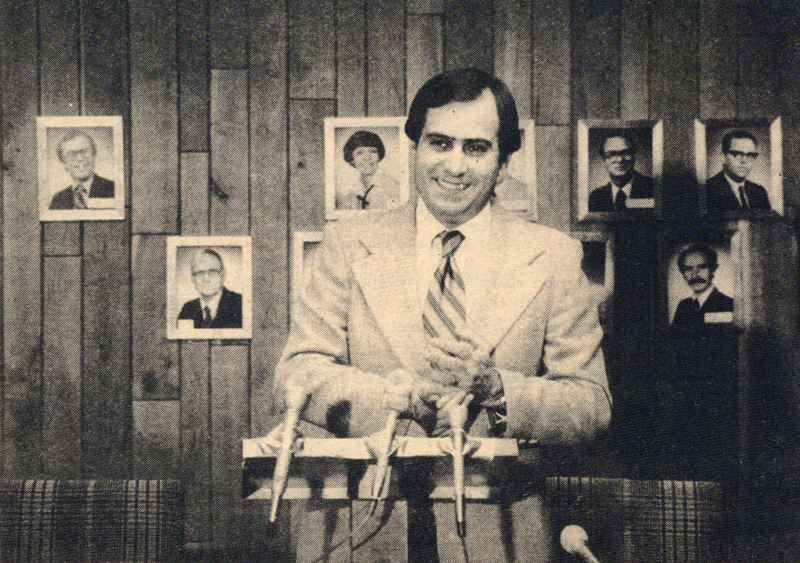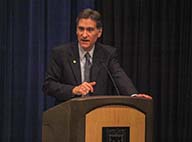He could not say he was shocked when only four members of the Board of Regents voted to renew his contract as president.
He survived conflict, questions of legal proceedings and bad press.
He endured a time on campus of tension and turmoil.
Constantine Curris could not say he was not prepared to leave Murray State and step down as president in 1982.

“I understand that it was politics,” Curris told The News in ’82. “It had nothing to do with my performance as president.”
Curris left Murray State after an attempt by the board to fire him in an executive session away from the eyes of the public. The Regents, along with several local lawyers, gathered more than 20 charges against the president to oust him.
After 18 months of court cases, agreements and executive sessions, the board allowed Curris to serve out his time at Murray State. At a meeting before the June 30, 1982, deadline, the board chose not to renew Curris’ contract with a 5-4-1 vote.
Soon after, Gov. John Brown Jr. asked the state-appointed Regents to resign, and installed a new board and chair.
Despite the arrival of new Regents, Curris released a statement to the governor saying he would not ask the board for a contract extension. He informed the press that he would begin searching for a new position elsewhere.
Curris told The News in October of 1982 that conflict between the board and president arose because the Regents were politically focused in their decisions.
“I have defended myself and I have responded to things done by the board, but I have never tried to go out and do to the board what they did to me,” Curris said. “The viciousness with which some people dealt with the situation was appalling.”
Curris went on to serve as president at the University of Northern Iowa and Clemson University, and president of the American Association of State Colleges and Universities.
In 2009, Gov. Steve Beshear appointed Curris to stand as chair of the Murray State Board of Regents.
ANOTHER NONRENEWAL
Three years following his appointment, Curris was considering the performance of President Randy Dunn, and deciding with the board whether or not to renew his contract. The board created an ad hoc committee to discuss the contract and provide a report to the Regents on the University’s growth during Dunn’s term.
The committee originally decided to discuss the findings with the board at the March 15, 2013 meeting, and then vote at the next. However, the report was circulated to the Regents two days before the March meeting and was never publicly discussed.
At the March 15 meeting, a motion was made to vote on the renewal of Dunn’s contract. The proposal of a vote was never mentioned in the meeting agenda, only the approval of minutes for the ad hoc committee’s meeting in February.

Dunn said he did not see the ad hoc committee report until after the vote was made not to renew his contract. In a meeting with faculty and staff, Dunn addressed the report, calling it selective and inappropriately gathered.
The report, obtained by The News through an open records request, contained several pieces of information evaluating Dunn in financial, academic and behavioral aspects. Several letters from alumni were also attached, some approving and some disapproving of Dunn’s performance.
The final section of the report addressed a communication problem between Dunn and the board, particularly the chair. Dunn implied he never got the chance to defend himself to the members of the board on the supposed problem with communication.
“Disagreement does not equal disrespect,” Dunn said.
Curris, during his time as president, expressed similar problems with communication and transparency.
In ’82, Chair Ron Christopher gave Curris the opportunity to resign before any charges were found against him, several months before the decision was made not to renew his contract. Curris alleged that five members of the board, including the chair, had either personally participated in or were knowledgeable of the undertaking to wrongfully, unlawfully and unconstitutionally remove him.
“The resolution implied, if not in fact resolved that a fair opportunity would not be given to defend myself,” Curris said.
He then filed suit with attorney William Logan against the Board of Regents.
ANOTHER LEGAL ISSUE
Prior to the original vote by the board in ’82 to oust Curris, five Regents met, ate lunch and discussed University business, as confessed by Regents to Logan. Right before the meeting, the Student Regent checked the Murray State legal library for information on firing the president of a public University.
At the time, Curris displayed his distrust for the board and the politics in which they secretly participated.
Curris and the current Board of Regents have now been found guilty by the attorney general for holding a meeting of quorum without taking minutes, at a Regent’s house the night before the March 15 meeting. Curris and other Regents said Dunn’s performance and other University matters were discussed at that social gathering.
The next day, the Board voted 7-4 not to renew Dunn’s contract.
Lexington, Ky., attorney Jim Deckard filed a complaint with Curris, asking him to void any action of the meeting after what he considered was an illegal gathering of the board. Curris denied his request, and Deckard filed a formal complaint with the attorney general.
After the attorney general released his opinion, finding the board in violation of two Kentucky Open Meetings Act laws, Deckard said he would sue the board if it did not void the actions of the meeting. If Deckard sues, the case will be taken to Calloway County Circuit Court.
As coverage of the illegal meeting by major news outlets and organizations spread, several Murray State alumni have come forward in support of Dunn. Richard Hurt, a medical doctor for the Mayo Clinic, told the board in a letter he would pay for Dunn’s legal fees to sue them and withdraw his donations from the University if they did not reconsider his contract.
“(Hurt) has a passion for the University and justice, and seeing things done the right way,” Dunn said. “He’s upset about what he saw happen here with my nonrenewal.”
Richard Hurt is the brother of Harold Hurt, one of the attorneys who represented the Board of Regents in ’82 in the attempt to oust Curris. At the time, Curris would not sign off to pay the board attorneys, as their services were never approved by Attorney General Steve Beshear.
Beshear refused to approve the services because the board already had legal representation, and the University president was required to sign off for the payment of counsel as well.
Dunn said it is too early to tell what action will be taken legally, but he acknowledged the issue is not at its end. He said with time, after the conflict ends, a positive feeling will return to the Murray State campus.
After Curris made the decision to not pursue a contract renewal with the new group of Regents in ’82, he spoke on a similar note. He described a warm glow returning to campus after more than two years of a dark period in Murray State’s history.
Curris told The News in ‘82 of three goals he had throughout the conflict: “To fight for my reputation and good name; to thwart the political and unprincipled efforts to remove me from the presidency; and to work to restore a progressive climate on campus that would again attract and retain quality faculty, staff and students.”
Story by Lexy Gross, Editor-in-Chief.